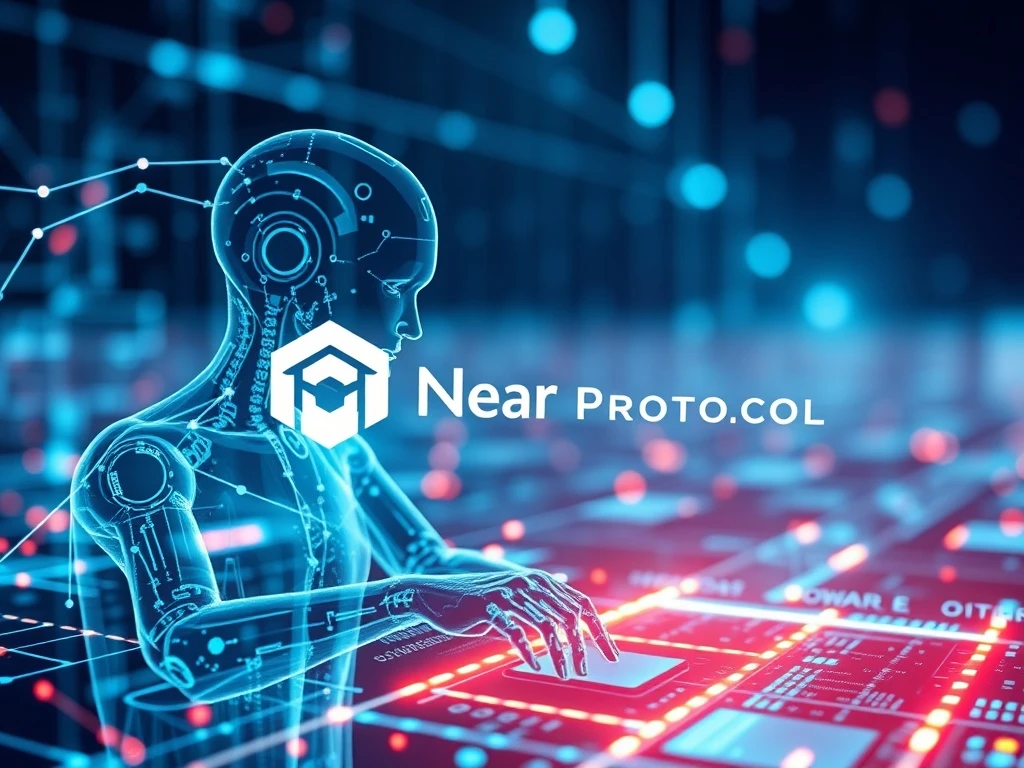Near Protocol AI: Revolutionizing DAO Governance with Intelligent Digital Twins

Decentralized autonomous organizations (DAOs) represent a pivotal shift in digital coordination. However, they often face a critical challenge: low **voter participation crypto**. This apathy can undermine decentralization and hinder effective decision-making. The Near Foundation is now pioneering a groundbreaking solution. They are developing an advanced **Near Protocol AI** system. This system features AI-powered ‘digital twins’ designed to enhance **DAO governance** and address this widespread issue head-on. This innovative approach promises to reshape how DAOs operate.
Unlocking the Future of DAO Governance with Near Protocol AI
The Near Foundation is actively developing sophisticated **AI delegates**. These delegates will eventually vote on behalf of its DAO members. This initiative directly targets the low voter engagement typical across many protocols. Lane Rettig, a key researcher at the Near Foundation, specializes in AI and governance. He confirmed to Crypto News Insights that this AI-powered governance overhaul is currently in development. The Near Foundation oversees the robust layer-1 Near Protocol.
The core concept is straightforward yet powerful. Each user will have a ‘digital twin.’ This delegate will learn individual preferences over time. Consequently, it will act accordingly during governance decisions. Rettig described this transformation at the Token2049 conference in Singapore. He envisions the voting process becoming a ‘math problem.’ This allows decisions to ‘happen almost instantly.’ Users will ‘set this thing loose,’ and it will act on their behalf. It will vote and even ‘nudge’ them when relevant proposals emerge. This vision represents an ‘end game’ for Near. It aims to replace human actors with a **digital twin crypto** to solve persistent voter apathy and participation problems.
Tackling Low Voter Participation Crypto Head-On
Low **voter participation crypto** poses significant risks to DAOs. On average, participation rates range between 15% and 25%. This often leads to power centralization. It can also result in ineffective decision-making. In severe cases, it creates vulnerabilities for governance attacks. A malicious actor might acquire enough tokens to pass damaging proposals unnoticed. Near’s **AI delegates** seek to mitigate these dangers. By automating informed voting, they aim to ensure broader, more consistent engagement. This protects the integrity of decentralized systems.
Lane Rettig emphasized the necessity of this innovation. He stated that the AI-powered governance overhaul for Near Protocol’s DAO is crucial. It promises a future where every member’s voice is effectively represented. This system will learn from user behavior. It will then apply that understanding to complex voting scenarios. Thus, it enhances both security and efficiency in **DAO governance**. The project reflects a commitment to genuine decentralization.
The Evolution of AI Delegates: From Chatbots to Digital Twins
The rollout of these **AI delegates** will occur in carefully planned stages. Initially, early models will function much like chatbots. They will offer advice and context. These basic agents will have limited agency. They can help users understand proposals better. They might even fill out basic templates for voting. This empowers users to feel more informed and engaged. This foundational stage is critical for user adoption and trust. It builds familiarity with AI assistance in governance.
Progressively, these delegates will evolve. They will first represent large groups sharing similar voting preferences. Ultimately, the vision is to assign an individual delegate to each person. This personalized **digital twin crypto** will deeply understand specific user values. It will then vote precisely according to those learned preferences. Rettig even speculated about the possibility of AI delegate CEOs. This suggests a profound shift in organizational structures. VanEck estimates show rapid growth in AI agents within crypto. The number surpassed 10,000 by late 2024. It is expected to exceed 1 million by 2025. This trend underscores the broader industry movement towards AI integration.
Ensuring Human Oversight in AI-Powered DAO Governance
Despite the advanced capabilities of **Near Protocol AI**, human input remains vital. Rettig firmly believes in keeping a ‘human in the loop.’ Certain proposal categories are simply too critical for AI to handle alone. These include decisions concerning significant fund allocations or major strategic pivots. For such high-stakes scenarios, human judgment is indispensable. The AI can certainly provide valuable recommendations. It can nudge users towards informed choices. However, the final decision-making power should rest with individuals.
The system will learn from its mistakes. If an AI delegate votes incorrectly, it signals a flaw in its contextual understanding. This feedback loop is essential for continuous improvement. It ensures the AI becomes more aligned with user values over time. This balanced approach merges efficiency with accountability. It leverages AI’s strengths while respecting the nuances of human decision-making. Consequently, this hybrid model enhances trust in **DAO governance**.
Securing Decisions: Verifiable Training for Near Protocol AI
The widespread adoption of AI agents in crypto brings both opportunities and concerns. Security risks are paramount. There is also the potential for AI to mishandle important decisions if relied on too heavily. The Near Foundation addresses these challenges proactively. They are implementing a verifiable model training system. This system provides cryptographic proof of the AI’s training cycles and inputs. Rettig explained that this transparency is crucial. It ensures the **AI delegates** remain aligned with a user’s values. This commitment to verifiable training builds confidence in the system’s integrity.
Furthermore, AI agents are already prevalent across the crypto landscape. They build Web3 applications, launch tokens, and interact autonomously with services and protocols. Some platforms even explore AI agents for automated trading. This broad integration highlights the growing reliance on AI. The Near Digital Collective, Near’s main DAO, already uses an AI tool called Pulse. Pulse tracks community sentiment. It summarizes Discord forums. It also highlights important content. This demonstrates a progressive approach to AI adoption. These tools lay the groundwork for more advanced **DAO governance** solutions.
The Phased Approach to AI Delegate Rollout
Near’s strategy for **AI delegates** begins with ‘low hanging fruit.’ Early models will act as advanced chatbots. They offer advice, context, and can fill basic templates. This helps users make better-informed decisions. The ultimate rollout will progress through distinct stages. First, AI delegates will represent large groups with similar voting preferences. Next, the system will move towards individual delegates for each person. Eventually, it might even feature AI delegate CEOs. This gradual implementation allows for refinement and adaptation.
Ultimately, governance becomes a ‘math problem.’ All agents are present and understand how everyone will vote. Therefore, a vote can happen almost instantly. This streamlines the decision-making process significantly. This efficiency is a core benefit of the **Near Protocol AI** system. It promises to overcome the inertia often seen in traditional DAO voting. This revolutionary approach could set a new standard for decentralized organizations. It transforms **voter participation crypto** from a challenge into an automated strength.
The Near Foundation’s initiative represents a significant leap forward for **DAO governance**. By integrating advanced **Near Protocol AI** and **digital twin crypto** technology, they aim to solve the persistent issue of low **voter participation crypto**. While challenges remain, particularly concerning security and maintaining human oversight, the phased rollout and verifiable training model demonstrate a thoughtful approach. This innovative use of **AI delegates** could usher in a new era of efficient, truly decentralized decision-making across the Web3 ecosystem.









